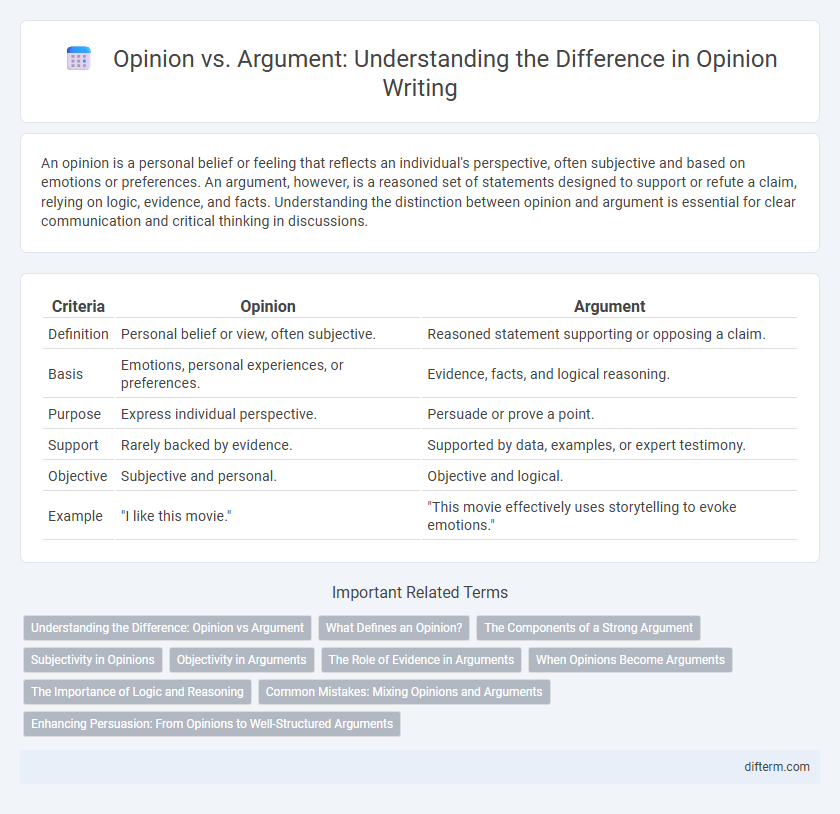An opinion is a personal belief or feeling that reflects an individual's perspective, often subjective and based on emotions or preferences. An argument, however, is a reasoned set of statements designed to support or refute a claim, relying on logic, evidence, and facts. Understanding the distinction between opinion and argument is essential for clear communication and critical thinking in discussions.
Table of Comparison
| Criteria | Opinion | Argument |
|---|---|---|
| Definition | Personal belief or view, often subjective. | Reasoned statement supporting or opposing a claim. |
| Basis | Emotions, personal experiences, or preferences. | Evidence, facts, and logical reasoning. |
| Purpose | Express individual perspective. | Persuade or prove a point. |
| Support | Rarely backed by evidence. | Supported by data, examples, or expert testimony. |
| Objective | Subjective and personal. | Objective and logical. |
| Example | "I like this movie." | "This movie effectively uses storytelling to evoke emotions." |
Understanding the Difference: Opinion vs Argument
Understanding the difference between opinion and argument is crucial for effective communication, as an opinion reflects a personal belief without needing evidence, while an argument is supported by logical reasoning and factual evidence. Opinions are subjective and often based on feelings or preferences, whereas arguments aim to persuade others through structured claims backed by data. Recognizing this distinction enhances critical thinking and enables clearer, more rational discussions.
What Defines an Opinion?
An opinion is defined by personal beliefs, feelings, or preferences that reflect an individual's subjective viewpoint without requiring empirical evidence. Unlike arguments, opinions do not necessitate logical reasoning or support from factual data. They express individual perspectives that are inherently flexible and vary greatly among people.
The Components of a Strong Argument
A strong argument consists of a clear claim supported by relevant evidence and logical reasoning, ensuring it persuades the audience effectively. It requires acknowledging counterarguments while providing well-substantiated refutations to reinforce credibility. Incorporating factual data, expert testimony, and coherent structure enhances the argument's strength beyond mere personal opinion.
Subjectivity in Opinions
Opinions reflect personal beliefs shaped by individual experiences, emotions, and perspectives, making them inherently subjective and resistant to objective validation. Unlike arguments, which rely on evidence and logical reasoning to persuade, opinions prioritize personal interpretation over universal truth. The subjectivity in opinions highlights the diverse nature of human thought, emphasizing the importance of respecting different viewpoints.
Objectivity in Arguments
Objectivity in arguments ensures that claims are supported by evidence and logical reasoning, differentiating them from mere opinions based on personal beliefs or emotions. Evaluating arguments requires examining factual accuracy and relevance rather than subjective viewpoints to maintain credible discourse. Objective arguments contribute to constructive debates by prioritizing verifiable information over individual perspectives.
The Role of Evidence in Arguments
Evidence plays a critical role in arguments by providing factual support that strengthens claims and enhances credibility. Unlike opinions, which are subjective and personal, arguments rely on verifiable data, statistics, and logical reasoning to persuade others. The effective use of evidence transforms mere opinions into compelling, rational arguments grounded in reality.
When Opinions Become Arguments
Opinions become arguments when they are supported by evidence, reasoning, and logical structure to persuade others. This transformation requires presenting claims alongside relevant facts, examples, or expert testimony to validate the viewpoint. The strength of an argument depends on the quality of its supporting evidence and clarity of its reasoning.
The Importance of Logic and Reasoning
Logic and reasoning form the foundation of effective arguments, transforming subjective opinions into persuasive claims supported by evidence. A well-constructed argument employs critical thinking to evaluate premises and reach sound conclusions, distinguishing it from mere personal belief. Prioritizing logic enhances clarity and credibility, enabling constructive dialogue and informed decision-making.
Common Mistakes: Mixing Opinions and Arguments
Confusing opinions with arguments often leads to weak reasoning because opinions are personal beliefs while arguments require evidence and logic. Many mistakenly present subjective views as facts, undermining credibility and clarity in discussions. Clear differentiation between opinion and argument strengthens persuasive communication and critical thinking skills.
Enhancing Persuasion: From Opinions to Well-Structured Arguments
Transforming opinions into well-structured arguments enhances persuasion by providing clear evidence and logical reasoning that support claims. Incorporating facts, statistics, and credible sources strengthens the validity of the argument, making it more convincing to the audience. A cohesive argument anticipated objections and addresses counterpoints effectively, elevating its overall impact compared to mere subjective opinions.
opinion vs argument Infographic

 difterm.com
difterm.com